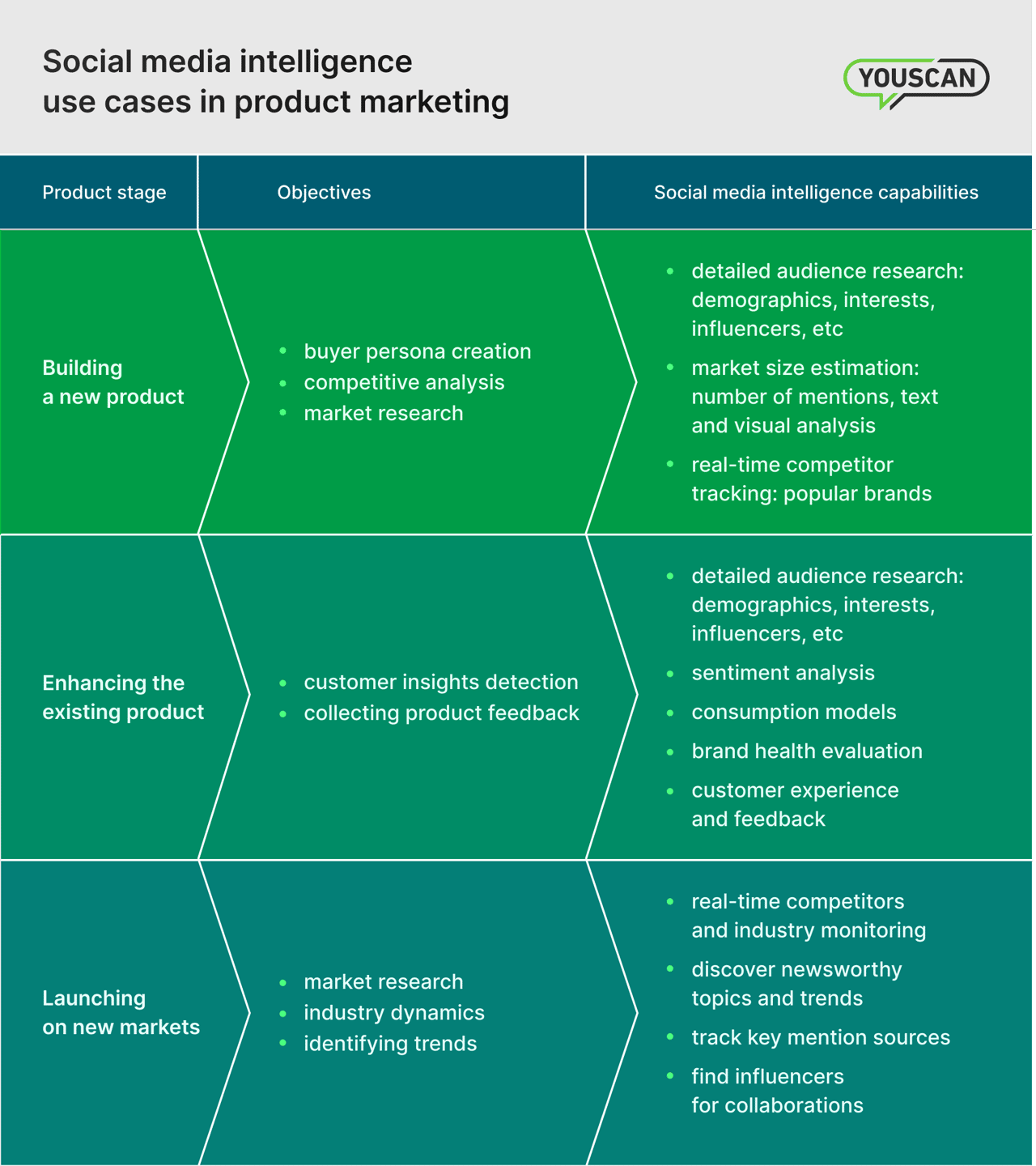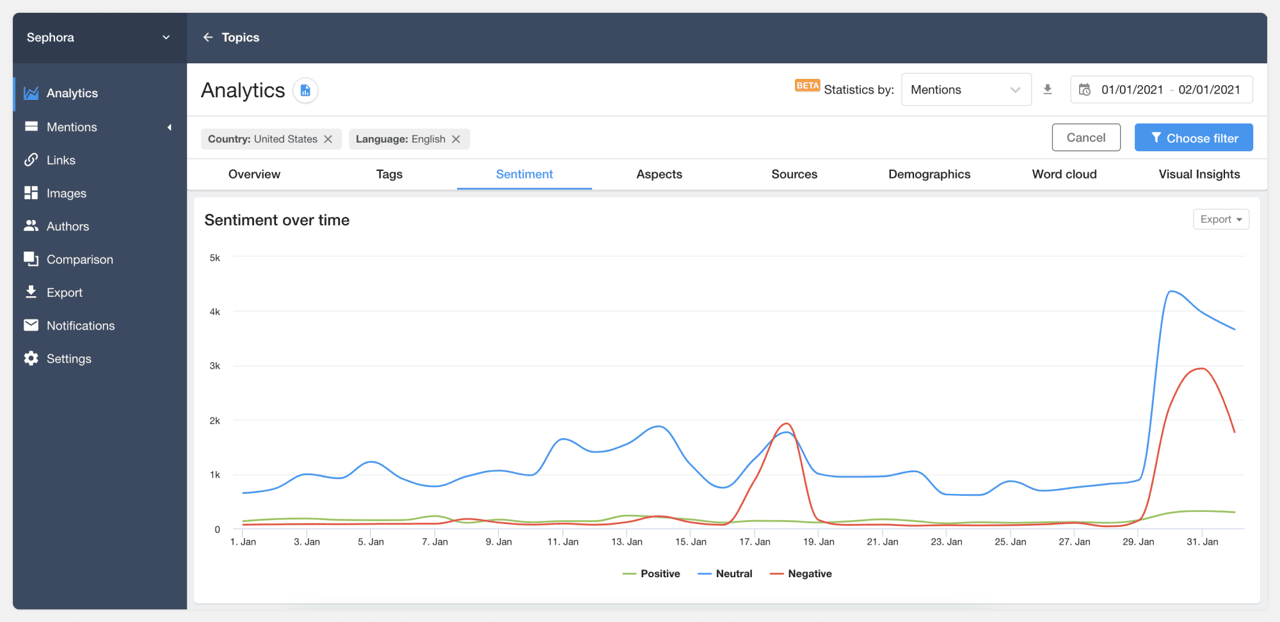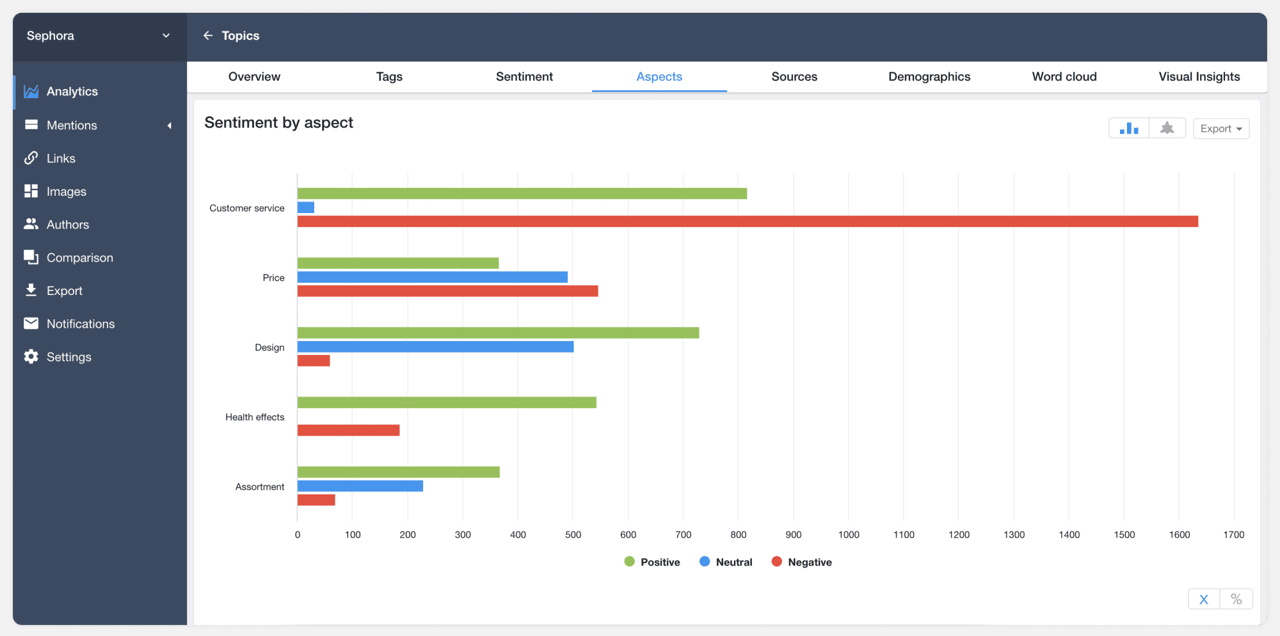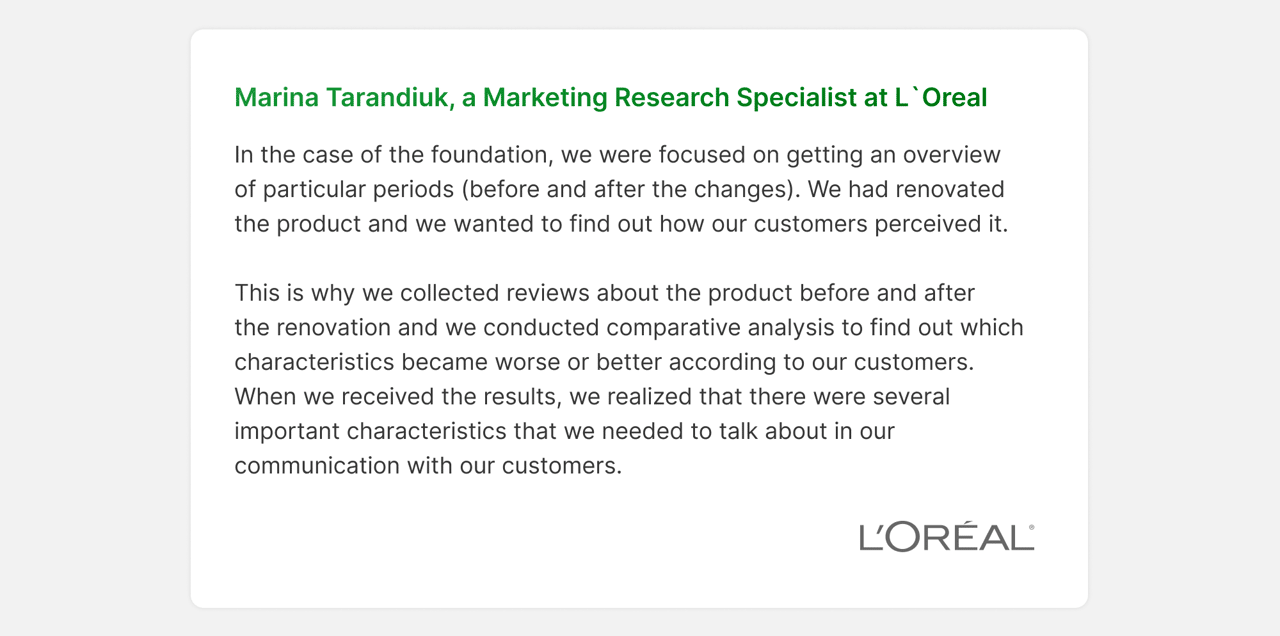Social media intelligence use cases in product marketing

Listening to what your customers are saying about your product or brand is no longer enough. Analyzing this information and making data-driven decisions is what you need. We'll tell you how to do that in this article.
If you are reading this article, you are probably the product marketing manager, product manager, product owner, or at least familiar with this topic. But you might ask, "What is social media intelligence, and how can it be connected to product marketing?"
SI or social media intelligence is a process of implementing social media data in your business. Simply put, it's when you take all the gathered data about your brand/company from social media platforms, analyze it and get the insights that can be used for solving complex problems.
Social intelligence is also commonly confused with social listening, which is actually the process of collecting and monitoring data on social media platforms using special software.
Product marketing and social media intelligence capabilities overview
Today we feel overwhelmed by the number of products, services, and choices. For example, inventing the car was a breakthrough in 1886, but in 2021 we can choose between hundreds of vehicles: electric or petrol, coupe or sedan, BMW or Mercedes, etc.
Nowadays, developing a new product requires a team that will cover different aspects, and product marketers take a position on a par with developers. Creating a great functional product is no longer enough to succeed. The attention of your prospects and customers becomes a target.
Unfortunately, there are millions of ideas and products that didn't work out because nobody needed them. Why did that happen? These companies concentrated on their ideas, skipped the market research, and missed the fact that there was no market demand.
The output is:
A product marketer's mission is to focus on a client, not on product features.
Nevertheless, it's crucial to understand customer needs and interests without relying on personal beliefs. Traditionally marketers used such tools as focus groups, customer surveys, mystery shopping, etc. These methods are still working, but they all have common disadvantages: long time for execution, not reliable data (people don't always tell the truth), and price (the more people are involved in the process, the higher is the cost).
On the other hand, people are used to sharing their experiences about products and services online, including social media platforms, review websites, Q&A platforms, and so on. This priceless data can and should be used by marketers to create and promote products in a human-centered way.
Collecting such amounts of information is physically impossible. Fortunately, social intelligence can help marketers to get meaningful insights and make data-driven decisions.
Here is a concise list of product marketer's tasks where social media intelligence is useful.


Now let's move to examples:
Use cases of social media intelligence depending on your product stage:
Building a new product
The time when you are just building a product – is the most flexible. At this stage, you are free to change any aspect, starting from core features to positioning.
But when you have so many opportunities, it might be tough to focus on the main idea, your potential clients, and a chosen marketing strategy.
First, you need to conduct a market research to estimate its size and spot the opportunities. Using SI, you can track the real number of mentions within a category, including text and visual content. Meaning you will see not only the number of these mentions but also their sentiments, aspects, sources, and so on.
Then, you have to complete your buyer persona profile. Having some details in mind, you should also check if data can confirm these hypotheses. Does your imaginary "Steven, 25-45, working in a tech startup" really reads Forbes, or he prefers to chat on Reddit? You might use social intelligence to perform a detailed audience analysis that includes demographics, interests, intends, and behavioral patterns. You can discover the most popular online platforms where your potential customers are most active, influencers within an industry, why people are buying this or another product, etc.
Social intelligence is also handy for competitive analysis because you can create a query containing your main competitors and check what users say about them on social. For instance, if your competitors lack a feature or have some weak points, you can use it as a unique proposition in your own product.
Note:
Though the research phase is crucial, be sure not to stretch it in time. Otherwise, you risk launching an outdated product. Better start with an MVP (minimum viable product) and then develop it rather than miss your perfect time. Social media intelligence is a great tool to speed up this process and identify early trends.
Enhancing an existing product
At this stage, it feels safer to market your product as you already know your clients. But that doesn’t mean you can stop monitoring their attitude and changes in their behavior.
Social intelligence creates the full picture of your customer base – starting from audiences' segmentation according to demographics and interests ending up tracking their sentiments. For example, this dashboard shows the dynamics of sentiments over time, including positive, negative, and neutral mentions.


At the same time, it's useful to understand what customers feel about different products' aspects. The system can automatically recognize both the meaning of posts and their tone. As a result, you get a table showing what can be improved and where you are doing your best.


Social media monitoring can also uncover new consumption models of your product that you would never imagine. For example, we bet that Coca-Cola technologists would never think that someone would restore rusty tools with this beverage's help.
If you have a digital product, such as a mobile app, you have an opportunity to track all the actions within it and get fast data insights such as what features they use most frequently. But if your product is a physical one, you are forced to ask people directly or find these answers on social media. Except for their sentiments, people might also share ideas of enhancing your product. Maybe they are waiting for the new function, package, taste, or anything else. After all, satisfying customer's needs is what every brand desires to achieve.
Collecting customer feedback is another task that can be performed using social intelligence. AI-powered tools such as YouScan can track even those mentions where users didn't tag the brand or a product. That means you can discover the dissatisfied clients and provide them with customer help right away. Or, vice versa, answer your promoters and turn them into ambassadors. And all that without hiring social media analysts.
Here is a small comment of our client L'Oréal who used our system to analyze the reviews on their new product and improve the communication about it.


Launching on new markets
Taking a step into the unknown – that is how you might feel when it's decided to expand your companies presence on new markets. If you are going to cover the new state or city, it feels familiar, but a product launch can be tricky when it comes to new countries.
When entering foreign markets, it's crucial to double-check any market research results you get. Be sure to learn all the local traits because a new country might have contrasting culture codes and perceptions of the common things for you. For example, the attitude to work-life balance is almost opposite in Japan and Spain. Beauty trends differ significantly in South Korea and France. The list can be extended with thousands of examples. The main idea is that the brand's positioning must be adapted to the local market.
Now you don't need to travel to the country you plan to do business or hire a local agency. You can check all these trends with the help of social intelligence. Just create a query including the needed location, tags, and demographics. Even if the local language is uncommon to you, images will speak for themselves.
You can also check what is trending among your target audience on the new market, detect the most popular sources, and discover local influencers for future collaborations.
Bottom line
Despite its name, product marketing is more about the customers than the product itself. That can be your prospects, current or lost clients, or even customers of your competitors. But what unites them is social media intelligence allowing you to monitor what these people discuss online and build your strategy based on this data.
Ready to discover your customer's sentiments? Request our free demo and boost your product marketing!




